|
|
|
Sort Order |
|
|
|
Items / Page
|
|
|
|
|
|
|
| Srl | Item |
| 1 |
ID:
146854
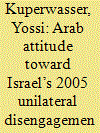

|
|
|
|
|
| Contents |
Brig.-Gen. Yossi Kuperwasser served as the head of the Research Division for Military Intelligence of the Israel Defense Forces in 2005 at the time of the disengagement from Gaza and parts of Northern Samaria. Because of his special vantage point he is able to bring a new insight to the subject. Intelligence professionals were not consulted in the decision-making process. While the Prime Minister and his confidants hoped that this initiative would result in a political advantage for Israel and strengthen its security, it is clear that they did not take possible Arab and Palestinian reactions into account, particularly those of Hamas. In this article Brig.-Gen. Kuperwasser presents the issue of disengagement from a fresh perspective and describes its unintended consequences, which could have been foreseen.
|
|
|
|
|
|
|
|
|
|
|
|
|
|
|
|
| 2 |
ID:
146856
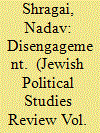

|
|
|
|
|
| Contents |
The disengagement and its disappointments have been part of public discourse in Israel for the past decade. Among the topics are: “Hamastan”; the nine thousand uprooted settlers; the 11,600 rockets fired at Israel and the eight military operations which followed. Nevertheless, an essential question remains unanswered: did Prime Minister Ariel Sharon implement this plan because he genuinely believed in it or were his motives based upon self-interest? Was his real aim to extricate himself from the criminal investigations against him? There are several schools of thought which have attempted to explain what ultimately led the prime minister to make this crucial decision. On the one hand, some, such as Defense Minister Moshe Ya’alon, believe that Sharon was motivated by “external considerations and personal distress,” and former Member of Knesset Zvi Hendel still contends that it was the investigations that led to the evacuation of the Gaza Strip. On the other hand, Dov Weisglass [occasionally spelled “Weissglass”], director of Sharon’s office, and Eyal Arad, Sharon’s strategic adviser, argue that such allegations are baseless and false. The purpose of this article is to present and review the opposing perspectives regarding the motivation for Sharon’s decision. Based on the available evidence, the author concludes that it is not possible to offer a definitive and unequivocal answer. However, it is important to present the differing views as they help us appreciate the diversity of vantage points involved both in making the decision and in the subsequent analysis of the disengagement.
|
|
|
|
|
|
|
|
|
|
|
|
|
|
|
|
| 3 |
ID:
146855


|
|
|
|
|
| Contents |
While nearly half of the Israeli public opposed the idea of withdrawal from Gaza and parts of Northern Samaria, the implementation of the disengagement plan met with a minimum of resistance. The reasons for the above may be found by examining the ideological background of two schools of modern Zionist thought: the imperative of clinging to the land, that is, the Land of Israel, versus the acceptance of geographically unspecific territorialist ideas. Despite the fact that clinging to the Land of Israel has deep roots in the country’s national ethos, many Zionist thinkers espoused the principles of territorialism, which ultimately prevailed among the decision-makers who planned and carried out the disengagement.
|
|
|
|
|
|
|
|
|
|
|
|
|
|
|
|
| 4 |
ID:
146858
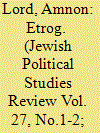

|
|
|
|
|
| Contents |
This article describes the protection and favor that the media and the courts extended to Prime Minister Ariel Sharon from the moment that he announced the disengagement plan in December 2003 up to and after the withdrawal from Gaza and part of northern Samaria in August 2005. Senior journalist and commentator, Amnon Abramovich pioneered the idea of treating the prime minister like an “etrog” (the citron which is blessed during the Feast of Tabernacles [Sukkoth]) and stored in cotton and gauze. This gentle handling enabled Sharon to carry out the evacuation of settlements and escape criminal investigations. The media thus shifted from reporting and commenting on events to becoming a supporter of the reversal of Sharon’s stated policy by delegitimizing opponents of the disengagement and preventing the public debate. Amnon Lord, currently a columnist of the weekly Makor Rishon and an editor of the Hebrew website, Mida, describes the ‘group-think’ mentality of many Israeli journalists and commentators and discusses the frequently deleterious role of the media in dictating the public agenda. In this process, the media found willing partners in the legal system which harmed democracy in Israel.
|
|
|
|
|
|
|
|
|
|
|
|
|
|
|
|
| 5 |
ID:
146859
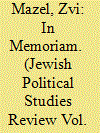

|
|
|
|
|
| Contents |
Meir Rosenne was one of the last representatives of a remarkable generation of Israeli diplomats who were born in Europe, survived the Holocaust and made the defense of the Jewish State their cause and purpose in life. The son of Jacob and Minna Rosenhaupt, Meir was born in 1931 in Jassy or Iasi, former capital of Moldavia and the capital of Rumania (1916-1918). Jassy was also the center of a thriving Jewish community. During World War II, a third of the community was killed in the worst pogrom of the war in Rumania.
|
|
|
|
|
|
|
|
|
|
|
|
|
|
|
|
| 6 |
ID:
146860
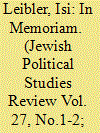

|
|
|
|
|
| Contents |
As we commemorate a year since Yehuda Avner passed away at the age of 86, we honor a noble Israeli who devoted his entire life to serving the Jewish state and the Jewish people. He was my dearest friend with whom I was in almost daily contact over the past decade.
|
|
|
|
|
|
|
|
|
|
|
|
|
|
|
|
| 7 |
ID:
146857
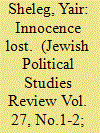

|
|
|
|
|
| Contents |
The disengagement from the Gaza Strip and parts of Northern Samaria in 2005 affected the religious Zionist public more than other sectors of Israeli society because most of the settlers are religious Zionists. Yair Sheleg examines the changes among religious Zionists during the decade since the disengagement. He discusses the question whether such changes were the direct results of the disengagement or could be attributed to general trends in Israeli society. The article focuses upon five major attitudes of the religious Zionists that underwent changes, as follows: the attitude toward the state; toward the authorities; toward religious faith; toward political opponents and toward the Arabs. Sheleg notes a more critical attitude toward the state, a distancing from formerly esteemed rabbis and political figures, a tendency toward spirituality and less institutionalized faith, harsher language against the Left and an increase in attacks against Arabs. Despite the above, loyalty to the State of Israel remains steadfast, along with a willingness to contribute to society and no major loss of religious faith.
|
|
|
|
|
|
|
|
|
|
|
|
|
|
|
|
|
|
|
|
|